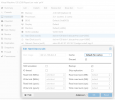The Proxmox VE 6.3 (Hyper-converged Infrastructure) cluster has a virtual machine running MS Windows 2016.
Characteristics of this virtual machine
bootdisk: scsi0
ostype: win10
scsi0: rbd:vm-126-disk-0,discard=on,size=256G
scsi1: rbd:vm-126-disk-1,discard=on,size=1000G
scsihw: virtio-scsi-pci
Get-ItemProperty -Path "HKLM:\System\CurrentControlSet\Control\FileSystem" -Name DisableDeleteNotification
DisableDeleteNotification : 0
PSPath : Microsoft.PowerShell.Core\Registry::HKEY_LOCAL_MACHINE\System\CurrentControlSet\Control\FileSystem
PSParentPath : Microsoft.PowerShell.Core\Registry::HKEY_LOCAL_MACHINE\System\CurrentControlSet\Control
PSChildName : FileSystem
PSDrive : HKLM
PSProvider : Microsoft.PowerShell.Core\Registry
I try to call the cmdlet in PowerShell
Optimize-Volume -DriveLetter D -ReTrim –Verbose
Error output.
Optimize-Volume : Failed
Activity ID: {60aab7f7-4345-447d-b0fa-e5b1e2ad9126}
+ Optimize-Volume -DriveLetter D -ReTrim –Verbose
+ ~~~~~~~~~~~~~~~~~~~~~~~~~~~~~~~~~~~~~~~~~~~~~~~
+ CategoryInfo : NotSpecified: (StorageWMI:ROOT/Microsoft/...age/MSFT_Volume) [Optimize-Volume], CimException
+ FullyQualifiedErrorId : StorageWMI 4,Optimize-Volume
There are no problems with Linux operating systems! Help solve the problem on MS Windows.
Please do not suggest zeroing the disk through utilities like sdelete. This is a long and not entirely correct solution to the problem.
Characteristics of this virtual machine
bootdisk: scsi0
ostype: win10
scsi0: rbd:vm-126-disk-0,discard=on,size=256G
scsi1: rbd:vm-126-disk-1,discard=on,size=1000G
scsihw: virtio-scsi-pci
Get-ItemProperty -Path "HKLM:\System\CurrentControlSet\Control\FileSystem" -Name DisableDeleteNotification
DisableDeleteNotification : 0
PSPath : Microsoft.PowerShell.Core\Registry::HKEY_LOCAL_MACHINE\System\CurrentControlSet\Control\FileSystem
PSParentPath : Microsoft.PowerShell.Core\Registry::HKEY_LOCAL_MACHINE\System\CurrentControlSet\Control
PSChildName : FileSystem
PSDrive : HKLM
PSProvider : Microsoft.PowerShell.Core\Registry
I try to call the cmdlet in PowerShell
Optimize-Volume -DriveLetter D -ReTrim –Verbose
Error output.
Optimize-Volume : Failed
Activity ID: {60aab7f7-4345-447d-b0fa-e5b1e2ad9126}
+ Optimize-Volume -DriveLetter D -ReTrim –Verbose
+ ~~~~~~~~~~~~~~~~~~~~~~~~~~~~~~~~~~~~~~~~~~~~~~~
+ CategoryInfo : NotSpecified: (StorageWMI:ROOT/Microsoft/...age/MSFT_Volume) [Optimize-Volume], CimException
+ FullyQualifiedErrorId : StorageWMI 4,Optimize-Volume
There are no problems with Linux operating systems! Help solve the problem on MS Windows.
Please do not suggest zeroing the disk through utilities like sdelete. This is a long and not entirely correct solution to the problem.


